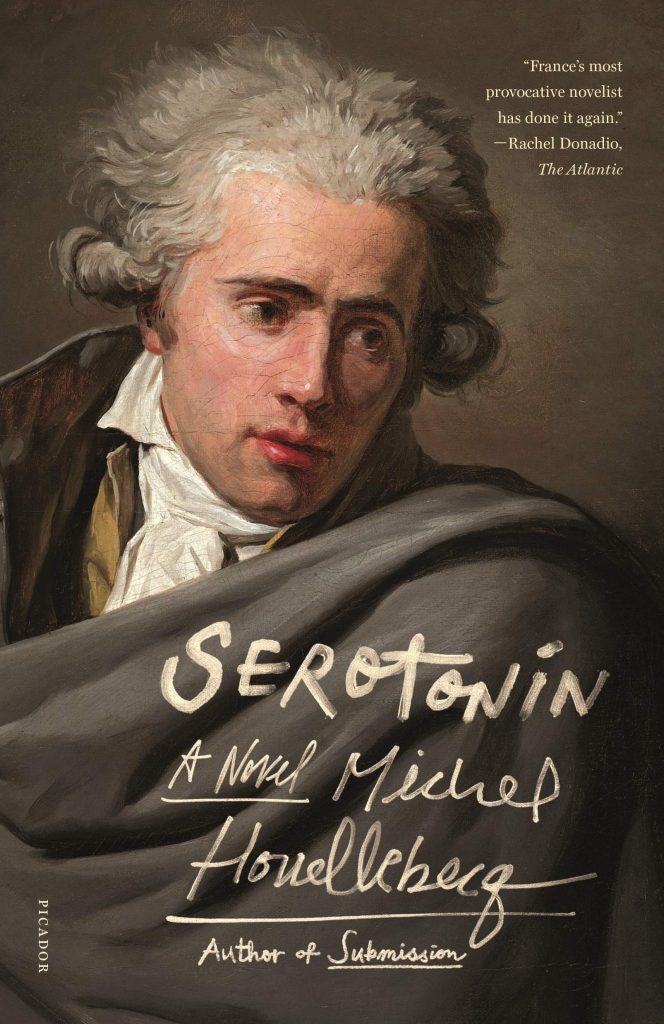 Michel Houellebecq’s Serotonin is a caustic, frightening, hilarious, raunchy, offensive, and politically incorrect novel about the decline of Europe, Western civilization, and humanity in general.
Michel Houellebecq’s Serotonin is a caustic, frightening, hilarious, raunchy, offensive, and politically incorrect novel about the decline of Europe, Western civilization, and humanity in general.
Deeply depressed by his romantic and professional failures, the aging hedonist and agricultural engineer Florent-Claude Labrouste feels he is “dying of sadness.” He hates his young girlfriend, and the feeling is almost certainly mutual; his career is pretty much over; and he has to keep himself thoroughly medicated to cope with day-to-day life.
Suffocating in the rampant loneliness, consumerism, hedonism, and sprawl of the city, Labrouste decides to head for the hills, returning to Normandy, where he once worked promoting regional cheeses and where he was once in love, and even–it now seems–happy. There he finds a countryside devastated by globalization and by European agricultural policies, and encounters farmers longing, like Labrouste himself, for an impossible return to a simpler age.
As the farmers prepare for what might be an armed insurrection, it becomes clear that the health of one miserable body and of a suffering body politic are not so different, and that all parties may be rushing toward a catastrophe that a whole drugstore’s worth of antidepressants won’t make bearable.
Praise for Serotonin
Like nearly every Houellebecq novel, “Serotonin” should be stamped on its spine with a tiny skull and crossbones, like you used to see on bottles of poison, to keep away the devout, the unsuspecting and the pure of heart . . . Houellebecq arrives in your life “waving genitals and manuscripts,” to borrow a phrase from “Howl.” Don’t feed his characters. They will keep coming around.
–Dwight Garner, New York Times
Houellebecq once again puts on the mantle of a literary prophet . . . Serotonin challenges its readers to soften their hearts toward those among us who are refused official pity — the sorts of people, dairy farmers, gilets jaunes, and lonely white quadragenarian men included, who seem less likely to evoke compassion in the present political climate. Like all of Houellebecq’s work, Serotonin is, at times, hilarious, sexually graphic, and shockingly irreverent. But it is also a novel of moral seriousness, daring us to increase our compassion in proportion to the seeming loathsomeness of those to whom it is owed.
–Louis Betty, Los Angeles Review of Books
France’s most provocative novelist has done it again . . . Although it’s a sophisticated work of literature written in a mournful key, Serotonin might as well have a jacket blurb from Steve Bannon . . . The work’s themes include the effects of antidepressants on the male libido, the difficulty of sustaining meaningful relationships, and the impossibility of finding happiness, let alone spiritual satisfaction, in a consumer society. Consider it as The Magic Mountain for the post-Brexit era.
–Rachel Donadio, The Atlantic
Houellebecq’s disdain for the emptiness of modern western life often leaves him spookily ahead of the game . . . Critics accuse Houellebecq of nihilism. Not so: he is a moral conservative behind all the libertine swagger and stone-faced mischief.
–Boyd Tonkin, Financial Times
